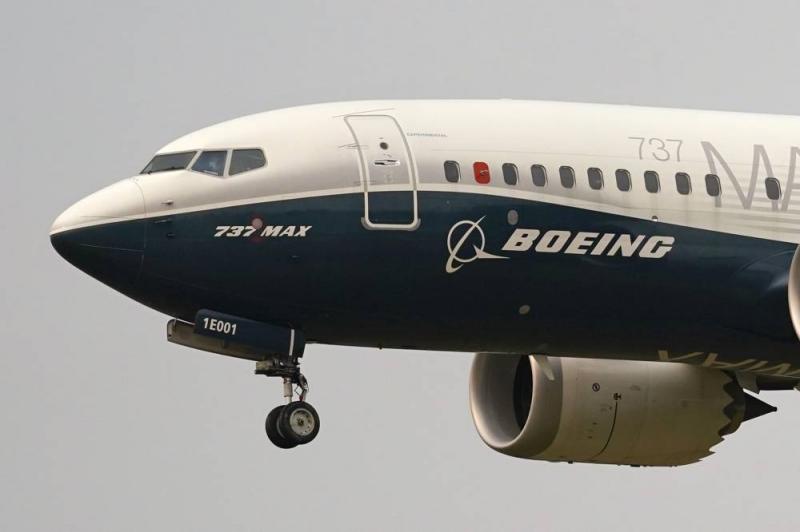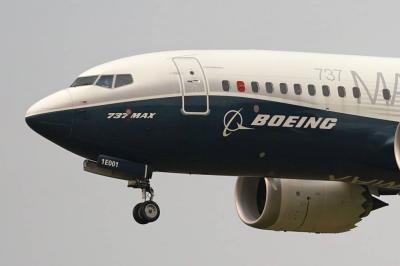In a new setback for the giant aircraft manufacturer Boeing, the Federal Aviation Administration (FAA) in the United States has launched an investigation into the potential presence of components made from titanium in some recently manufactured aircraft, which were sold using fake documentation, raising additional safety concerns about the structural integrity of these aircraft.
The New York Times reported on Friday that a supplier of spare parts had detected small holes in the material due to corrosion, prompting an investigation into the forged titanium documentation from Spirit AeroSystems, which supplies Boeing and Airbus with this material. The FAA stated in a press release that it is investigating the scope of the problem and trying to assess the short- and long-term safety implications, but it is unclear how many aircraft contain parts made from these questionable materials.
Boeing has been informed about a voluntary disclosure to the FAA regarding purchasing materials through a distributor that may have forged or provided incorrect records. Boeing issued a bulletin outlining ways suppliers should remain vigilant for potential forged records.
### A Series of Unfortunate Incidents
This revelation comes amid intense scrutiny of Boeing and the wider aviation industry, which is grappling with a series of unfortunate incidents and safety issues. In January, a door panel on a Boeing 737 Max 9 exploded during flight, leading to several federal investigations. In April, Boeing informed the FAA about the potential forgery of inspection records related to 787 Dreamliner wings, indicating that required inspections concerning the aircraft wings may have been skipped, and that some Dreamliners still in production would need to be re-evaluated.
On May 30, Boeing submitted a plan to the FAA detailing safety improvements it intends to implement and committed to holding weekly meetings with the agency. Boeing CEO Dave Calhoun is scheduled to testify next Tuesday before a Senate committee regarding the company’s safety concerns.
### The Issue of Fake Titanium
The potential use of counterfeit titanium, not previously reported, threatens to extend industry issues beyond Boeing to its European competitor, Airbus. The aircraft that included components made from this material were manufactured between 2019 and 2023, including some Boeing 737 Max and 787 Dreamliners, as well as Airbus A220 aircraft, according to three insiders who spoke to the New York Times, though it remains unclear how many of these aircraft are in service or which airlines own them.
Spirit is working to determine the source of the titanium and whether it met the appropriate standards despite its forged documentation, and whether the parts made from this material are structurally sound enough to withstand the expected life of the aircraft. Spirit stated that it is trying to identify the most effective way to remove affected parts and replace them if necessary. Joe Buchino, a spokesperson for the company, mentioned, "It's about the forged documents, and once we realized that counterfeit titanium had found its way into the supply chain, we immediately contained all suspected parts to determine the scope of the issue."
The implicated titanium has been used in various aircraft parts, according to Spirit officials. For the 787 Dreamliner, this includes the passenger entry door, cargo doors, and a component that connects the engines to the aircraft structure. For the 737 Max and A220, the affected parts include thermal shields that protect a component linking the aircraft's engine to the frame from high temperatures.
Both Boeing and Airbus stated that their tests on the affected materials have not shown any signs of issues so far. Boeing indicated that it directly purchased most of the titanium used in its aircraft manufacturing, thus the majority of its supplies are unaffected. They stated, "This issue affects some shipments of titanium received by a limited group of suppliers, and tests conducted so far indicate that the correct titanium alloys have been used," and assured, "To ensure compliance, we are removing any affected parts from aircraft before delivery. Our analysis shows that the fleet currently in service can continue to fly safely."
Similarly, Airbus confirmed that the airworthiness of the A220 remains intact, stating in a statement, "Numerous tests have been conducted on parts coming from the same source," adding that "the safety and quality of our aircraft are our top priorities, and we are working closely with our suppliers."
### Financial Troubles
Spirit, the titanium supplier, has faced quality and financial issues in recent years, undergoing renewed scrutiny this year following the January incident involving a door panel on a 737 Max. According to the New York Times report, the problem dates back to 2019 when a Turkish company purchased a batch of titanium from a supplier in China and then sold it to several companies manufacturing aircraft parts, which eventually made its way to Spirit for use in Boeing and Airbus aircraft.
In December 2023, an Italian company noticed that the titanium they purchased seemed different from what they typically received, and Titanium International Group found that the attached certificates appeared to be fraudulent. The New York Times reported that the Turkish company did not respond to requests for comments. Spirit began investigating the matter and informed Boeing and Airbus in January that they were unable to verify the source of the titanium used in certain parts.
Francesca Conti, the general manager of Titanium International Group, stated that the incident is under investigation and that she cannot provide additional details. She added, "We are cooperating with the relevant authorities to address any issues that are ultimately identified."
### What Are the Fake Documents?
The documents in question are known as certificates of conformity. Spirit officials indicated that they serve somewhat as a birth certificate for titanium, detailing its quality, manufacturing processes, and source. According to insiders, it appears that an employee at the company that sold the titanium forged details on the certificates, claiming that the material came from another Chinese company, which often supplies certified titanium; this company confirmed that it did not supply Spirit with titanium, while its origin remains unclear.
Greg Brown, Spirit’s senior vice president for global quality, stated that without knowledge of the material source or handling, it is impossible to verify the airworthiness of the parts. He added, "Our quality management process relies on the traceability of raw materials all the way from the mills," noting, "There has been a loss of traceability in that process and a challenge in documentation."
The company is working with customers to identify affected aircraft, asserting that actively flying planes will be monitored by airlines and removed from service sooner than usual if necessary. It is likely that affected parts will be removed during routine maintenance inspections, regardless of whether the titanium was inspected or not.




